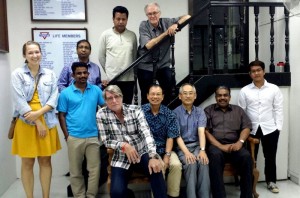“Interfaith Cooperation in Peace Building is a Priority”, Asian Ecumenical Leaders Affirm

“Interfaith Cooperation for Peace Building in Asia is a priority concern of the Christian Conference of Asia (CCA) and the Asia Pacific Alliance of Young Men’s Christian Association (APAY). Both organisations are committed to support and lead the Interfaith Cooperation Forum activities through respective networks in various countries", stated the General Secretaries of CCA and APAY during the Working Committee and Joint Working Group Meetings of the Interfaith Cooperation Forum (ICF) held in Kuala Lumpur, Malaysia from 25 to 27 February 2016.
ICF, initiated by CCA and APAY in 2003 with the assistance of the Evangelischer Entwicklungsdienst - EED / Bread for the World, facilitates interfaith activities of justice and peace in Asia.
“Peace building in conflict-affected societies and reconciliation to move beyond conflicts for sustained peace with justice in post-conflict communities are priorities for CCA and its new program structure that gives special thrusts to peace building.The activities through ICF initiated by CCA and APAY more than a decade ago will have an added value to CCA’s peace building programs in Asia’s multi-religious contexts where interfaith perspective is essential”, said Dr. Mathews George Chunakara, General Secretary of CCA.
General Secretary of APAY Nam Boo-won stated during the meeting that “the YMCA movement in the Asia Pacific region through its 27 national affiliated bodies is committed to implement peace building programs in the coming years and interfaith perspective of peace and justice is important in most national situations in APAY’s work.”
The Joint Working Group meeting scheduled a special program on ‘School of Peace’ (SoP) for two weeks with the participation of representatives from CCA and APAY constituencies in various Asian countries, which will be held in Siem Reap, Cambodia in August 2016.
The main activity of ICF is the annual School of Peace which brings together up to twenty young people belonging to different religions and faith groups. The group shares a living and learning together experience for fourteen weeks.
The ICF activities have been coordinated by Max Edigar, a peace activist /trainer from the Mennonite Central Committee, who has been living and working in Asia for more than forty years. He started to work as a peace volunteer during the Vietnam war. Explaining the experiences of the participants who had undergone the SoP training, Max Edigar said that, “the participants share a common goal: Let us sit down together in this field of pain, and let us talk of things which bring peace.”
ICF provides platforms for several other activities such as workshops, internships as well as ongoing mentoring support to the participants after their return to their home countries.










